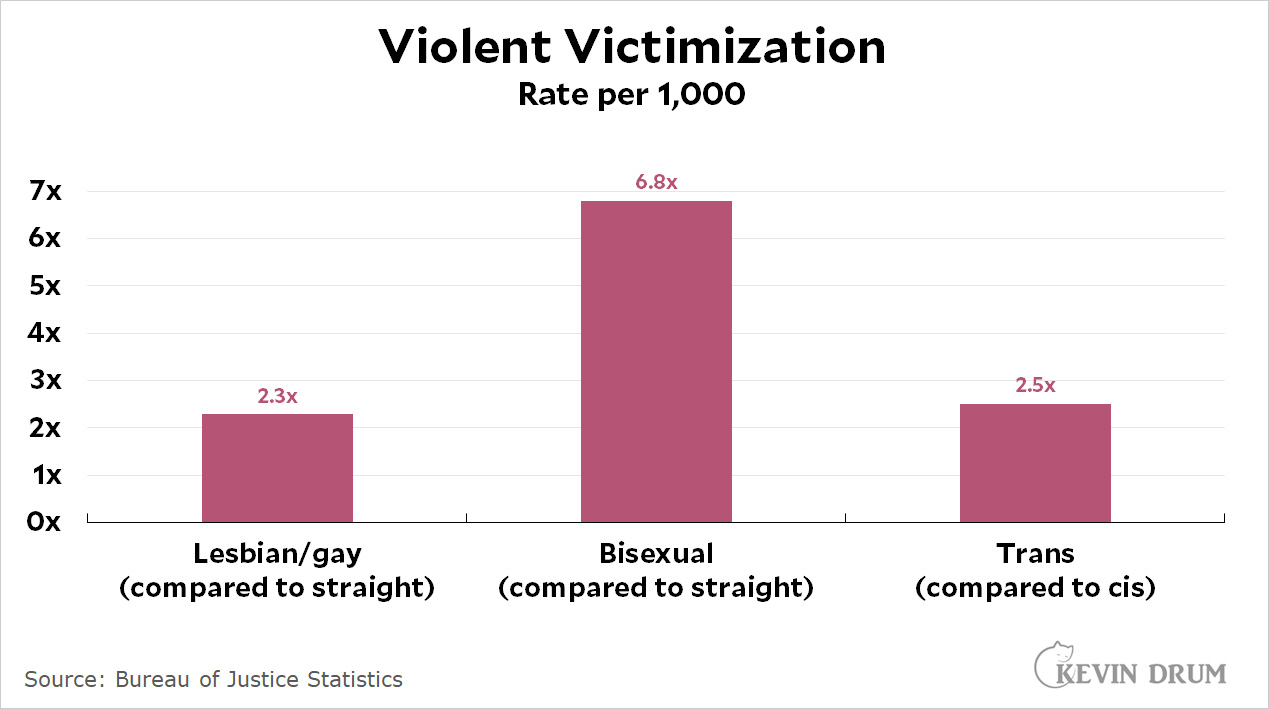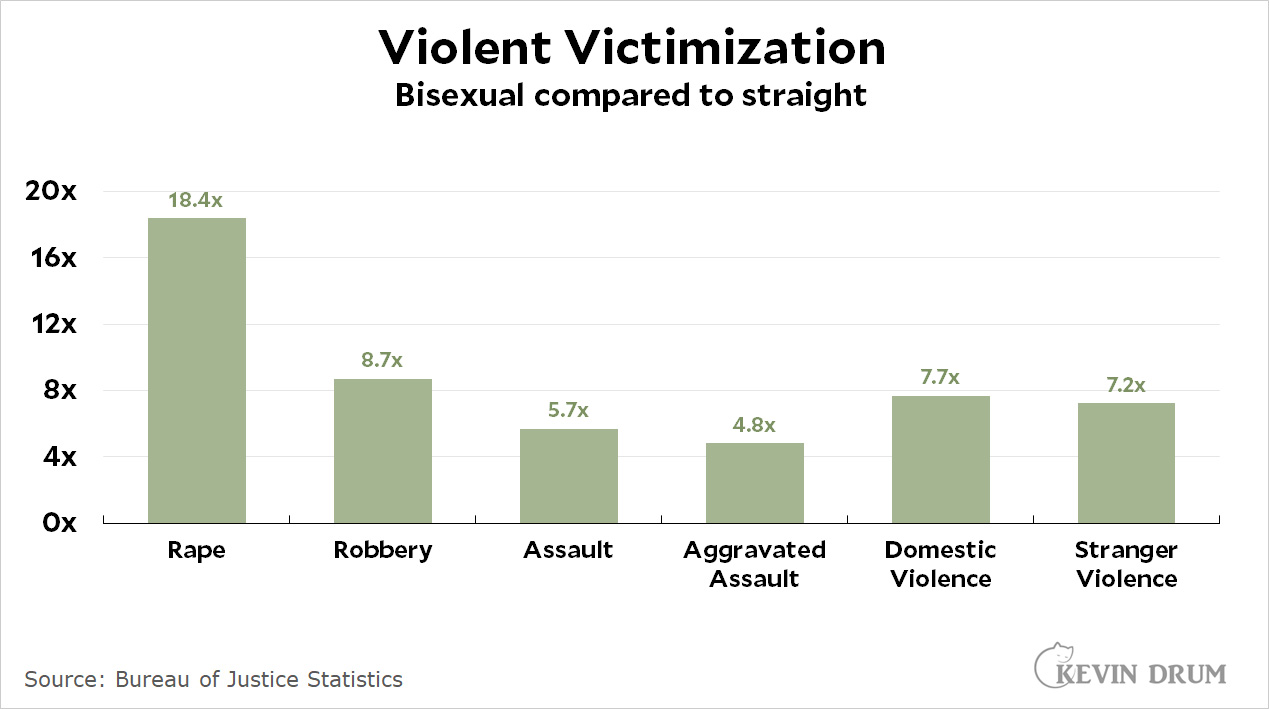This is from a recent report written by the Bureau of Justice Statistics:
 All of this is appalling, but why is crime against bisexual people so astronomically high? Why, for example, are bisexual people 8.7x times more likely to be robbed than straight people? Can someone school me?
All of this is appalling, but why is crime against bisexual people so astronomically high? Why, for example, are bisexual people 8.7x times more likely to be robbed than straight people? Can someone school me?


Don't know why would the rates in general be so high relative to straight and gay/lesbians, but at least the robbery stats to me seem to be an artifact of the rape ones. Once a person has been raped, the robbery could be an easy crime of opportunity.
Google paid 99 dollars an hour on the internet. Everything I did was basic Οnline w0rk from comfort at hΟme for 5-7 hours per day that I g0t from this office I f0und over the web and they paid me 100 dollars each hour. For more details
visit this article... https://createmaxwealth.blogspot.com
Yeah, and speaking of robbery...
My best guess is it's because bisexuals have higher rates of mental illness (compared to straight people but also compared to lesbian/gay). For all sorts of reasons, mental illness can lead people to be victimized.
I also wonder how this looks if you tease out sex. Bisexuals are a more female group than lesbian/gay (and why are we lumping together lesbians and gay people anyway?) and that could explain the higher rates of rape and domestic violence. Not sure about the robbery though!
Sorry, but by "gay" do you mean "male homosexuals" and is that why you are drawing a distinction between "lesbian" and "gay"? Isn't that another relic of male sexist terminology if you presume that "gay" excludes females?
I'm more interested in what your original thesis was that brought you to this topic.
However, if I may suggest, the reason might be that bisexuality is more about sex than about gender identity or the gender you're attracted to, and as such, bisexual people take greater risks.
"However, if I may suggest, the reason might be that bisexuality is more about sex than about gender identity or the gender you're attracted to"...
Bisexuality is literally, exactly, and only about the gender(s) you're attracted to.
The ‘Double Closet’: Why Some Bisexual People Struggle With Mental Health,
https://www.nytimes.com/2021/06/30/well/bisexual-mental-health-lgbt.html
It's easy to see how this circumstance can leave them more vulnerable to crime.
Perhaps bisexual people are more likely to retain ties to communities/people who are bigoted against them, especially if the bisexual person is currently involved in an opposite sex relationship...but things can get ugly quickly.
And, as mentioned above, it is a group that skews female. Plus, it is a group that gets harassment from both straight and gray communities.
The paper has some gender breakdowns, but not by every age, race, etc. however, while bisexual females are attacked almost 3x as often as bisexual males, the males are still attacked more than any other group of males or females!
That makes it seem like the fact that they don’t fit in a single category as neatly, then they are less socially protected by “their group”.
When people are marginalized, that exposes them to more dangers. Especially kids who are kicked out and/or feel they have to run away.
Moscow to set up a suicide squad by calling on suicidal men to enlist signalling they are running out of combat ready reserves,
https://londonlovesbusiness.com/moscow-to-set-up-a-suicide-squad-by-calling-on-suicidal-men-to-enlist-signalling-they-are-running-out-of-combat-ready-reserves/
There aren't really that many bisexuals.¹ I suspect a lot of them become "victims" of their failure to report their sexuality honestly, to surveyors as well as potential "victimizers." Generally, it's the lying about your sexuality that provokes hostility, not your sexuality itself. Bisexuals try to have it both ways so they put themselves at risk. They seem to think it's worth it. Clearly, it's not.
¹ There aren't very many LGs either. And the number of Ts is infinitesimal. If it wasn't about sex it's hard to believe anyone would be interested in these questions at all.
This suggests focusing a little more on the perpetrators and their motives.
I assure you we in the queer community are incredibly interested in the topic.
A majority of LGBTQ identifying individuals are bisexual females. Almost all of them have sex almost exclusively with heterosexual men. The bisexual assault number you see here is probably just the assault rate for women compared to straight women AND men. So ~2x from that. And because "bisexual" is now just code for "sexually open person", not surprising to see a ~3x increase there.
"And because "bisexual" is now just code for "sexually open person"
This is either ignorant or biphobic. Please don't repeat such "common knowledge". I know many other bisexuals, some of whom are in committed hetero relationships, others who are asexual but in committed relationships.
Rare is the person who will adopt an internal identifier that comes with no small amount of backlash in order to broadcast being very sex-positive.
My absolutely uninformed guess would be that the types of people more likely to self-identify as bisexual are people who are more at risk. I suspect people with long-term partners living in ultra-safe communities are more likely to identify as straight or gay/lesbian rather than bisexual, even if they are, strictly speaking, bi. I would guess people inclined to identify as bi are more likely to be younger and living in urban areas. I certainly could be wrong -- it's just a guess.
Well, let's turn it around. Who are the "victimizers"? And what might their motives be, relative to the sex - gender - sex preference - appearance etc of each category of victims?
I'm guessing that nearly all of these crimes are committed by non-homosexual males. But what do that actual statistics say?
(Note that when there's a mass shooting, coverage focuses on the perp, and not some kind of explanatory or expository detailing of his victims.)
Haven't we learned by now that numbers like this are meaningless unless we control for obvious confounders? According to this, violent victimization is far more common among younger people than among older: https://bjs.ojp.gov/sites/g/files/xyckuh236/files/media/document/cv20.pdf
And, according to this, the pct of people who identify as LGBTQ is much higher among younger than older people (and a ton of that is people who identify as bi): https://williamsinstitute.law.ucla.edu/visualization/lgbt-stats/?topic=LGBT#demographic
So, when you control for age (not to mention urban residence, and sex, as others have mentioned), I would bet this mystery disappears
"So, when you control for age (not to mention urban residence, and sex, as others have mentioned), I would bet this mystery disappears."
The report at Kevin's link has a bunch of demographic breakdowns. Bisexual victimization sticks out like a sore thumb, no matter what age group, race, or gender you're looking at.
But there, controlling just for age reduces the str v bi differential substantially; it is nowhere near the overall 6.8, except for the 18-24 group, which is 6. And that is controlling for just one confounder. Urban v suburban is going to affect the numbers, as is marital and family status -- people who have families are going to be less likely to be out late, etc.
Note also that there are some odd numbers ; the Bi to L/G ratio is only slightly above even for 25-34, but about 5x for the age groups bracketing that one?
There are a lot of reasons to refrain from making causal claims based on this superficial look at the data.
Does the paper make causal claims? From my quick skimming it is noting a pattern. You're right that the pattern could be illusory, and I have suspicions of any survey relying on self-identification, but that doesn't mean the topic shouldn't be examined.
I was referring to people here making causal claims, not to the paper. And of course the topic should be examined; who said otherwise? But doing fruitfulness requires understanding what is going on. Eg: some here have hypothesized that the causal mechanism lies in higher levels of mental illnessamong bisexuality. But if the rate of violent victimization is really 6.8x higher, that seems unlikely (though of course not impossible) given that the difference in mental health is not that enormous. But if the true difference in victimization is 50 pct greater, the mental health hypothesis is more plausible as a major determinant of differences in victimization.
It's not the full explanation. But that the survey puts women as 4x as likely to identify as bisexual than men (the only category in which women more commonly identify than men do) is almost certainly part of it.